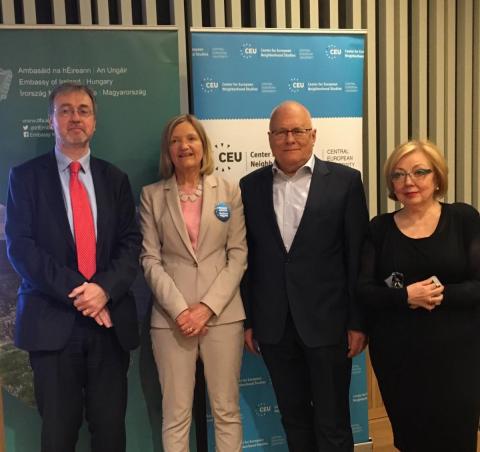4th Irish Speaker Program Lecture: Professor Brigid Laffan (EUI) on “Ireland and Europe in turbulent times”

Membership of the European Union is an opportunity that needs to be seized, according to Professor Brigid Laffan, Director of the Robert Schuman Centre for Advanced Studies at the European University Institute in Florence. That makes the success of Irish EU membership the Irish contribution to the EU. Ireland is the only country that succeeded to fully converge with the living standards of the richest EU members through its membership. Its case shows that it takes decades to catch up and that the quality of governance is crucial in this process, which can be a lesion the East-Central European member states, Laffan explained further.
Professor Laffan’s lecture was hosted on 11 May 2017 by CEU’s Center for European Neighborhood Studies (CENS) as the fourth instalment of the Annual Irish speaker series launched in 2014. The event was opened by CEU President and Rector Michael Ignatieff, who highlighted the close ties between CEU and EUI, evident in joint high profile research collaborations. At the same time, he expressed gratitude towards EUI as one of CEU’s strongest supporters in the current situation. In his opening remarks, the Irish Ambassador, H.E. Pat Kelly, pointed out the joint commitment to open debate and looked forward to many more years of cooperation between the Irish Embassy and CEU as neighbors in the fifth district of Budapest.
Professor Laffan opened her lecture expressing her support for CEU and stated that if CEU had to leave Hungary, this would constitute not only a great loss for the country but also a break in our civilization, not just our politics in Europe. She highlighted that the liberal elements of liberal democracy, the checks and balances, are crucial. Speaking about the situation of the European Union, she pointed out how the main regimes of the EU, the Eurozone currency area and the Schengen free travel zone, are being challenged today. In both cases, the Union struggles with burden sharing among its members. The length of the crisis poses a major problem for decision makers, as the necessary “heavy lifting’ cannot be done during recurring national election seasons.
A second key theme of the lecture was Brexit, to which Ireland is uniquely exposed. Professor Laffan argued that at the end of the Brexit process membership in the EU must still matter and Great Britain cannot have a status close to its current membership. Britain has become used to opt-out from EU obligations in the past, but Brexit cannot just be another opt-out, Laffan explained further.
At the same time, the EU will have to build the Union of the remaining 27 member states. Laffan explained that the EU is destined to disappoint, as 27 member states make decision-making processes difficult, however, the EU is the way Europe found to deal with the interdependence of its countries. It is the responsibility of domestic politics to make the case for Europe integration. Laffan concluded that Brexit does not make the EU stronger.
During the following Q&A session, the audience particularly probed Professor Laffan on the potential problems resulting from Brexit for the island of Ireland. She highlighted that the Good Friday agreement normalized British-Irish relations, while Brexit will accentuate intercommunal conflict in Northern Ireland. At the same time, Laffan explained that while Irish unification has never really been on the agenda, Brexit set off dynamics that could lead to it.
In thanking Professor Laffan, CENS director Professor Peter Balazs pointed out how listening to the lecture has improved the audience’s understanding of key developments in the EU and particularly the five scenarios for the future of the EU, outlined in the White Paper by Commission President Jean-Claude Juncker.
